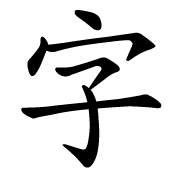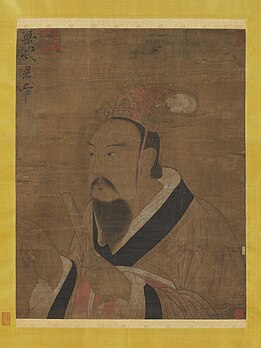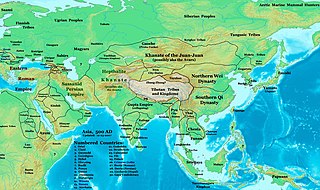| Xiao Zhengde | |||||||||
|---|---|---|---|---|---|---|---|---|---|
| Prince of Linhe Marquess of Xifeng | |||||||||
| Pretender of the Liang Dynasty | |||||||||
| Pretence | 548–549 | ||||||||
| Monarch(s) | Emperor Wu | ||||||||
| Died | 549 | ||||||||
| |||||||||
| House | Lanling Xiao | ||||||||
| Father | Xiao Hong | ||||||||
Xiao Zhengde (蕭正德) (died 549), courtesy name Gonghe (公和), was an imperial prince and briefly a pretender to the throne of the Chinese Liang Dynasty.

A courtesy name, also known as a style name, is a name bestowed upon one at adulthood in addition to one's given name. This practice is a tradition in the Sinosphere, including China, Japan, Korea, and Vietnam.

A pretender is one who maintains or is able to maintain a claim that they are entitled to a position of honour or rank, which may be occupied by an incumbent, or whose powers may currently be exercised by another person or authority. Most often, it refers to a former monarch, or descendant thereof, whose throne is occupied or claimed by a rival or has been abolished.

The earliest known written records of the history of China date from as early as 1250 BC, from the Shang dynasty, during the king Wu Ding's reign, who was recorded as the twenty-first Shang king by the written records of Shang dynasty unearthed. Ancient historical texts such as the Records of the Grand Historian and the Bamboo Annals describe a Xia dynasty before the Shang, but no writing is known from the period, and Shang writings do not indicate the existence of the Xia. The Shang ruled in the Yellow River valley, which is commonly held to be the cradle of Chinese civilization. However, Neolithic civilizations originated at various cultural centers along both the Yellow River and Yangtze River. These Yellow River and Yangtze civilizations arose millennia before the Shang. With thousands of years of continuous history, China is one of the world's oldest civilizations, and is regarded as one of the cradles of civilization.
Contents
It is not known when Xiao Zhengde was born, but it was known that he was the third son of Xiao Hong (蕭宏), a minor official during Southern Qi and a younger brother of the generals Xiao Yi (蕭懿) and Xiao Yan. As Xiao Yan initially did not have any sons, Xiao Yan adopted Xiao Zhengde to be his own son.

The Southern Qi (479-502) was the second of the Southern dynasties in China, followed by the Liang Dynasty. During its 23-year history, the dynasty was largely filled with instability, as after the death of the capable Emperor Gao and Emperor Wu, Emperor Wu's grandson Xiao Zhaoye was assassinated by Emperor Wu's intelligent but cruel and suspicious cousin Xiao Luan, who took over as Emperor Ming, and proceeded to carry out massive executions of Emperor Gao's and Emperor Wu's sons and grandsons, as well as officials whom he suspected of plotting against him. The arbitrariness of these executions was exacerbated after Emperor Ming was succeeded by his son Xiao Baojuan, whose actions drew multiple rebellions, the last of which, by the general Xiao Yan led to Southern Qi's fall and succession by Xiao Yan's Liang Dynasty.

Emperor Wu of Liang (梁武帝) (464–549), personal name Xiao Yan (蕭衍), courtesy name Shuda (叔達), nickname Lian'er (練兒), was the founding emperor of the Liang Dynasty of Chinese history. His reign, until the end, was one of the most stable and prosperous during the Southern Dynasties. He came from the same family that ruled Southern Qi, but from a different branch.
However, in 501, while Xiao Yan was engaged in a civil war against the cruel and arbitrary Southern Qi emperor Xiao Baojuan, Xiao Yan's concubine Ding Lingguang (丁令光) gave birth to a son, Xiao Tong. Despite that, after Xiao Yan overthrew Xiao Baojuan and in 502 forced Xiao Baojuan's brother Emperor He of Southern Qi to yield the throne to him, ending Southern Qi and starting Liang Dynasty (as its Emperor Wu), Xiao Zhengde hoped to be crown prince. Instead, Emperor Wu reversed the adoption and returned Xiao Zhengde to Xiao Hong's line, creating him only the Marquess of Xifeng.
Xiao Baojuan (蕭寶卷) (483–501), né Xiao Mingxian (蕭明賢), commonly known by his posthumously demoted title of Marquess of Donghun (東昏侯), courtesy name Zhizang (智藏), was an emperor of the Chinese dynasty Southern Qi. He was known as a violent ruler who executed high-level officials at his whim, and this drew several major rebellions, the last of which, by his general Xiao Yan, overthrew him and eventually his dynasty, with Xiao Yan establishing Liang Dynasty. He is known as the Marquess of Donghun because Xiao Yan demoted him to that title after he was killed in a siege of the capital Jiankang.

Xiao Tong, courtesy name Deshi (德施), formally Crown Prince Zhaoming, was a Crown Prince of the Chinese Liang Dynasty, posthumously honored as Emperor Zhaoming (昭明皇帝). He was the oldest son of Emperor Wu of Liang, whom he predeceased. Xiao Tong's enduring legacy is the literary compendium Wen Xuan.
Emperor He of Southern Qi ( 齊和帝) (488–502), personal name Xiao Baorong (蕭寶融), courtesy name Zhizhao (智昭), was the last emperor of the Chinese dynasty Southern Qi. He was put on the throne by the generals Xiao Yingzhou (蕭穎冑) and Xiao Yan in 501 as a competing candidate for the throne to his violent and arbitrary older brother Xiao Baojuan. In 502, with Xiao Baojuan having been defeated and killed and Xiao Yingzhou dead, Xiao Yan seized the throne from Emperor He and took the throne himself, ending Southern Qi and starting Liang Dynasty. Soon, Xiao Yan had the 14-year-old former Emperor He put to death.
Xiao Zhengde was not at all content with being just a marquess, and he resented the reversal of the adoption. In 522, [1] he fled to rival Northern Wei, claiming to be Liang's deposed crown prince, and sought military assistance. The Northern Wei official Xiao Baoyin, a brother of Xiao Baojuan, instead suggested that Xiao Zhengde be put to death. The Northern Wei government did not kill Xiao Zhengde, but did not treat him with respect. He believed himself to be in danger, and he created a subterfuge—killing a boy and claiming that the boy was his, burying the boy far from the Northern Wei capital Luoyang. In 523, he fled back to Liang. Emperor Wu did not punish him, and in fact restored him to his title and positions.

The Northern Wei or the Northern Wei Empire, also known as the Tuoba Wei (拓跋魏), Later Wei (後魏), or Yuan Wei (元魏), was a dynasty founded by the Tuoba clan of the Xianbei, which ruled northern China from 386 to 534 CE, during the period of the Southern and Northern Dynasties. Described as "part of an era of political turbulence and intense social and cultural change", the Northern Wei Dynasty is particularly noted for unifying northern China in 439: this was also a period of introduced foreign ideas, such as Buddhism, which became firmly established.
Xiao Baoyin (蕭寶寅) (487–530), courtesy name Zhiliang (智亮), was an imperial prince of the Chinese dynasty Southern Qi. In 502, as Southern Qi was on the edge of being taken over by the general Xiao Yan, who was preparing by killing the imperial princes, Xiao Baoyin fled to rival Northern Wei and became an official and general in the Northern Wei government. In 527, as Northern Wei was embroiled in agrarian rebellions, Xiao Baoyin rebelled and tried to reestablish Southern Qi, but was soon defeated and forced to flee to a rebel leader, Moqi Chounu (万俟醜奴), and he served under Moqi until both were captured in 530 by the paramount general Erzhu Rong's nephew Erzhu Tianguang. He was forced to commit suicide.

Luoyang is a city located in the confluence area of Luo River and Yellow River in the west of Henan province. Governed as a prefecture-level city, it borders the provincial capital of Zhengzhou to the east, Pingdingshan to the southeast, Nanyang to the south, Sanmenxia to the west, Jiyuan to the north, and Jiaozuo to the northeast. As of the final 2010 census, Luoyang had a population of 6,549,941 inhabitants with 1,857,003 people living in the built-up area made of the city's five urban districts, all of which except the Jili District are not urbanized yet.
After Xiao Zhengde's return to Liang, however, he did not regret his actions, but instead gathered thugs, often leading them in robberies. In 525, Xiao Zhengde was a general under the command of Emperor Wu's son Xiao Zong (蕭綜) the Prince of Yuzhang, defending the city of Pengcheng, which was surrendered to Liang by the Northern Wei general Yuan Faseng (元法僧) earlier that year. Xiao Zong, who had long suspected himself to be actually the son of Xiao Baojuan (since his mother Consort Wu was a concubine of Xiao Baojuan and had given birth to him only seven months after becoming Emperor Wu's concubine), defected to Northern Wei during the campaign, and his forces collapsed. Xiao Zhengde abandoned his troops and fled back to the capital Jiankang. Because of crimes he had previously committed and because of his abandoning his forces, Emperor Wu stripped Xiao Zhengde of his title and offices and exiled him to Linhai. However, even before Xiao Zhengde could reach Linhai, Emperor Wu sent a messenger pardoning him and restoring him to his title.

Jiankang, or Jianye, as it was originally called, was the capital city of the Eastern Wu, the Jin dynasty and the Southern Dynasties. Its walls are extant ruins in the modern municipal region of Nanjing.

Linhai is a county-level city in Taizhou, Zhejiang Province situated on the banks of the Lin River in Eastern China.
Xiao Tong died in 531, and Emperor Wu, because he then made Xiao Tong's younger brother Xiao Gang crown prince, bypassing Xiao Tong's sons Xiao Huan (蕭歡), Xiao Yu (蕭譽), and Xiao Cha, he created Xiao Huan, Xiao Yu, and Xiao Cha princes. At this time, Xiao Zhengde flattered Emperor Wu's favorite official Zhu Yi, and Zhu Yi spoke on his behalf, reminding Emperor Wu that Xiao Zhengde was previously his son, but was now only a marquess. Emperor Wu therefore created Xiao Zhengde the greater title of Prince of Linhe.
Emperor Jianwen of Liang (梁簡文帝), personal name Xiao Gang (蕭綱), courtesy name Shizuan (世纘), nickname Liutong (六通), was an emperor of the Chinese Liang Dynasty. He was initially not the crown prince of his father Emperor Wu, the founder of the dynasty, but became the crown prince in 531 after his older brother Xiao Tong died. In 549, the rebellious general Hou Jing captured the capital Jiankang, and Hou subsequently held both Emperor Wu and Crown Prince Gang under his power, having Crown Prince Gang take the throne after Emperor Wu's death later that year. During Emperor Jianwen's reign, he was almost completely under Hou's control, and in 551, Hou, planning to take the throne himself, first forced Emperor Jianwen to yield the throne to his grandnephew Xiao Dong the Prince of Yuzhang, and then sent messengers to suffocate the former emperor.
Xiao Zhengde was still not satisfied, however. When the general Hou Jing rebelled in fall 548, he, knowing Xiao Zhengde's disaffection, made secret overtures to Xiao Zhengde, promising to make him emperor. When Emperor Wu subsequently sent Xiao Zhengde with an army to try to resist Hou, Xiao Zhengde turned against Emperor Wu and joined forces with Hou. After Hou put Jiankang under siege and captured the outer city, forcing forces loyal to Emperor Wu to withdraw into the palace walls, Xiao Zhengde was declared emperor. He created his heir apparent Xiao Jianli (蕭見理) crown prince, and married a daughter to Hou. (Xiao Jianli soon died in a raid that he conducted at night.) He also made a pact with Hou that when the palace fell, Emperor Wu and Xiao Gang would not be spared. In spring 549, when Hou briefly entered into negotiations with Emperor Wu and Xiao Gang for peace, Xiao Zhengde spoke against it, and Hou subsequently reneged on the peace terms. When the palace fell, however, despite Xiao Zhengde's efforts to have Emperor Wu and Xiao Gang killed, Hou prevented it, instead using Emperor Wu as his pawn and deposing Xiao Zhengde back to his title of Prince of Linhe, although conferring him a highly honorary office of Dasima (大司馬). Xiao Zhengde became depressed, and when he subsequently met Emperor Wu, he wept bitterly. Emperor Wu responded, "You weep and weep, but is it not too late for you to regret?"
Xiao Zhengde resented Hou for reneging on the agreement, and he subsequently sent letters to his cousin Xiao Fan (蕭範) the Prince of Poyang, requesting that Xiao Fan come to Jiankang's relief. The letters were intercepted by Hou's forces, and in summer 549, Hou strangled Xiao Zhengde to death.

